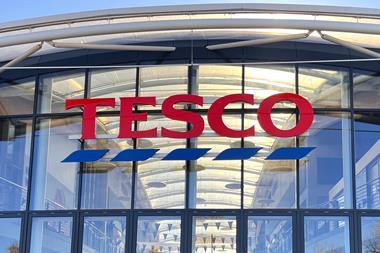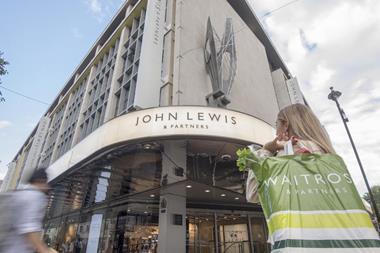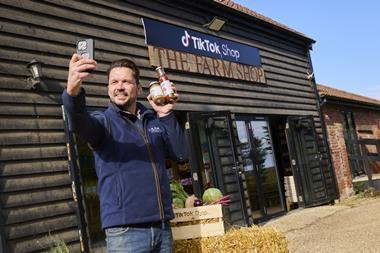Tesco’s dominance of the market has sparked a big reaction from its critics. But has it amounted to anything, asks Liz Hamson
And so the situation rumbled on as Tesco pushed ahead with further development and dealt with the tunnel collapse at Gerrards Cross. Those who agreed that Tesco was becoming too powerful could even check out a new web site that claimed to provide evidence from public interest groups showing what a problem it was.
As 2005 kicked off, media pundits were delivering stark warnings of an impending consumer backlash. The multiples - read Tesco - were too powerful, too profit-motivated and, well, too successful. They were turning the high street into a desert and shoppers were finally beginning to wake up to the fact.
Investigative journalist Joanna Blythman was just one member of the national media claiming that a shopper revolt was nigh.
“I expect the anti-supermarket backlash to intensify in 2005. Tesco and Asda are first in line to get it in the neck,” she predicted dramatically in the first issue of The Grocer this year. “People are beginning to realise that Asda is part of Wal-Mart and that neither it nor Tesco is a homespun grocer anymore. Rather they are both global corporations motivated purely by profit.”
But did the backlash actually materialise? The nationals certainly devoted significant column inches to it. And as far as rivals, independent chains and campaigners go, 2005 was the year the knives came out.
They were all at it in April, when Tesco broke through the 30% market share barrier for the first time and became the first UK retailer to post a profit of more than £2bn (see opposite page).
The redoubtable Alan Toft, then director general of the Federation of Wholesale Distributors, saw its pledge not to carry out any further acquisitions as an acknowledgment on its part that the backlash was real. “It is a gesture from Sir Terry Leahy that recognises the power of the lobby,” he said. “It has had to give a signal that it recognises the backlash is reaching a crescendo that can no longer be ignored.”
Others remained cynical. In one of several impassioned letters to The Grocer, Vicki Hird, senior food campaigner, Friends of the Earth, accused Tesco of “unrestrained expansion” that was “destroying our town centres by putting local shops out of business, leaving the public with less choice of where to shop”. The well of discontent rose still further in June when the New Economics Foundation published its report into ‘Clone Town Britain’ in which its author, Andrew Simms, claimed that the backlash had only just begun.
As concerns over supermarket dominance mounted, Tesco became shorthand for people’s unease and the word “Tescopoly” was born.
That said, the multiples pretty much all came under attack for their treatment of suppliers, Forum of Private Business chief executive Nick Goulding entering into a memorable war of words with Sainsbury chief executive Justin King over the retailer’s payment terms.
The unions were quick to pick up on the changing mood.
Few of the multiples were immune to mounting unrest among distribution workers and unions, with Asda and Morrisons arguably coming off worst, though Tesco had to contend with a driver revolt.
As far as proposals for new stores went, it didn’t matter who you were - the not in my back yard brigade were out to get you.
But with more stores on the drawing board than its rivals - in a dossier of 150 problem sites collated by Friends of the Earth, most involved Tesco - it inevitably attracted the most flak.
As far as Tesco’s detractors were concerned, the OFT topped the list of Tesco’s co-conspirators for failing to check its expansion and there were repeated calls for it to ditch its two-market definition of the sector.
Ben Pinnington, spokesman for the Forum of Private Business, summed up the frustration: “What we want to see is the OFT finally step up to the plate. It should be a tiger, not a pussycat.”
New OFT head honcho John Fingleton, however, fuelled the flames by arguing that hardship for individual groups of competitors did not necessarily equate to damage to competition or mean that consumers were worse off.
He added that Tesco shouldn’t be penalised for its adroit land assembly strategy in the 1990s.
Fingleton’s lack of sympathy for the plight of smaller retailers cast doubt over MP Jim Dowd’s ability to achieve anything as chairman of the All Party Parliamentary Small Shops Group. It also made the prospect of the OFT referring the grocery market for review considerably less likely.
Tesco itself played the whole threat of backlash down. At the height of the protests, marketing director Tim Mason insisted: “Customers are not expressing concern that Tesco has grown too big. They judge us on the merits of their shopping trip.” He was right to bring the debate back to what the shopper wants, said Mike Dennis of Cheuvreux. “Shoppers do not have the opinion that they can get too much of a good thing.”
Initially, the public backed him up. In February, a survey for The Grocer revealed that almost a third thought the retailer was a great British success. Just one in five felt it was too powerful.
By October, however, attitudes were shifting. A second survey showed that a third were uneasy about its dominance, although they were also shopping in greater numbers and spending more money at its stores.
Shore Capital’s Clive Black felt Tesco had nothing to worry about. “Consumers are still walking into Tesco in their droves,” he pointed out.
Whether they continue to do so next year is another matter. The backlash has so far been confined to interested parties. How long before the unease already registered by the general public translates into behaviour?
And so the situation rumbled on as Tesco pushed ahead with further development and dealt with the tunnel collapse at Gerrards Cross. Those who agreed that Tesco was becoming too powerful could even check out a new web site that claimed to provide evidence from public interest groups showing what a problem it was.
As 2005 kicked off, media pundits were delivering stark warnings of an impending consumer backlash. The multiples - read Tesco - were too powerful, too profit-motivated and, well, too successful. They were turning the high street into a desert and shoppers were finally beginning to wake up to the fact.
Investigative journalist Joanna Blythman was just one member of the national media claiming that a shopper revolt was nigh.
“I expect the anti-supermarket backlash to intensify in 2005. Tesco and Asda are first in line to get it in the neck,” she predicted dramatically in the first issue of The Grocer this year. “People are beginning to realise that Asda is part of Wal-Mart and that neither it nor Tesco is a homespun grocer anymore. Rather they are both global corporations motivated purely by profit.”
But did the backlash actually materialise? The nationals certainly devoted significant column inches to it. And as far as rivals, independent chains and campaigners go, 2005 was the year the knives came out.
They were all at it in April, when Tesco broke through the 30% market share barrier for the first time and became the first UK retailer to post a profit of more than £2bn (see opposite page).
The redoubtable Alan Toft, then director general of the Federation of Wholesale Distributors, saw its pledge not to carry out any further acquisitions as an acknowledgment on its part that the backlash was real. “It is a gesture from Sir Terry Leahy that recognises the power of the lobby,” he said. “It has had to give a signal that it recognises the backlash is reaching a crescendo that can no longer be ignored.”
Others remained cynical. In one of several impassioned letters to The Grocer, Vicki Hird, senior food campaigner, Friends of the Earth, accused Tesco of “unrestrained expansion” that was “destroying our town centres by putting local shops out of business, leaving the public with less choice of where to shop”. The well of discontent rose still further in June when the New Economics Foundation published its report into ‘Clone Town Britain’ in which its author, Andrew Simms, claimed that the backlash had only just begun.
As concerns over supermarket dominance mounted, Tesco became shorthand for people’s unease and the word “Tescopoly” was born.
That said, the multiples pretty much all came under attack for their treatment of suppliers, Forum of Private Business chief executive Nick Goulding entering into a memorable war of words with Sainsbury chief executive Justin King over the retailer’s payment terms.
The unions were quick to pick up on the changing mood.
Few of the multiples were immune to mounting unrest among distribution workers and unions, with Asda and Morrisons arguably coming off worst, though Tesco had to contend with a driver revolt.
As far as proposals for new stores went, it didn’t matter who you were - the not in my back yard brigade were out to get you.
But with more stores on the drawing board than its rivals - in a dossier of 150 problem sites collated by Friends of the Earth, most involved Tesco - it inevitably attracted the most flak.
As far as Tesco’s detractors were concerned, the OFT topped the list of Tesco’s co-conspirators for failing to check its expansion and there were repeated calls for it to ditch its two-market definition of the sector.
Ben Pinnington, spokesman for the Forum of Private Business, summed up the frustration: “What we want to see is the OFT finally step up to the plate. It should be a tiger, not a pussycat.”
New OFT head honcho John Fingleton, however, fuelled the flames by arguing that hardship for individual groups of competitors did not necessarily equate to damage to competition or mean that consumers were worse off.
He added that Tesco shouldn’t be penalised for its adroit land assembly strategy in the 1990s.
Fingleton’s lack of sympathy for the plight of smaller retailers cast doubt over MP Jim Dowd’s ability to achieve anything as chairman of the All Party Parliamentary Small Shops Group. It also made the prospect of the OFT referring the grocery market for review considerably less likely.
Tesco itself played the whole threat of backlash down. At the height of the protests, marketing director Tim Mason insisted: “Customers are not expressing concern that Tesco has grown too big. They judge us on the merits of their shopping trip.” He was right to bring the debate back to what the shopper wants, said Mike Dennis of Cheuvreux. “Shoppers do not have the opinion that they can get too much of a good thing.”
Initially, the public backed him up. In February, a survey for The Grocer revealed that almost a third thought the retailer was a great British success. Just one in five felt it was too powerful.
By October, however, attitudes were shifting. A second survey showed that a third were uneasy about its dominance, although they were also shopping in greater numbers and spending more money at its stores.
Shore Capital’s Clive Black felt Tesco had nothing to worry about. “Consumers are still walking into Tesco in their droves,” he pointed out.
Whether they continue to do so next year is another matter. The backlash has so far been confined to interested parties. How long before the unease already registered by the general public translates into behaviour?



















No comments yet